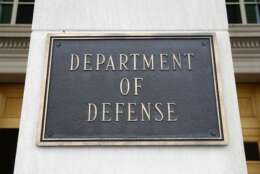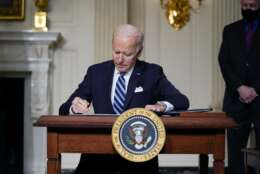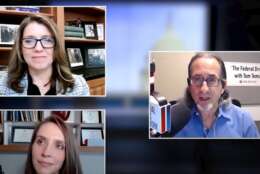climate change
-
The Pentagon will change the way it trains and equips troops and require some emissions transparency from contractors.
October 07, 2021 -
The Defense Department recently asked contractors, and any other interested parties, for comments about climate. In particular, climate-related disclosures, like whether organizations measure their carbon output or post it publicly.
September 17, 2021 -
This week hosts Mark Masselli and Margaret Flinter speak with renowned writer, environmentalist and climate activist Bill McKibben, whose seminal 1989 book “The End of Nature” was among the first to warn of the coming climate crisis. McKibben points to the dangerous rise in the earth’s temperature spawning droughts, destructive storms and other environmental catastrophes spurred by fossil fuel burning and deforestation. He says if we don't pass President Biden’s reconciliation bill, which has the most sweeping climate change legislation ever proposed in the US, "we won't get another chance". The legislation is a powerful step forward in incentivizing a US shift to renewable energy, which he says must be accomplished before the upcoming climate summit in Glasgow, the most important global climate gathering since the Paris Accords.
September 16, 2021 -
A forthcoming Federal Sustainability Plan will examine disclosures of greenhouse gas emissions from federal suppliers and policies to mitigate climate-related financial risks.
September 10, 2021 -
Tom Temin spoke to James Balocki, the acting principal deputy assistant Secretary of the Navy for energy, installations and environment, at the Sea Air Space conference.
August 04, 2021 -
For an update, at the SeaAirSpace conference, Federal Drive with Tom Temin caught up with the Coast Guard Commandant Adm. Karl Schultz.
August 03, 2021 -
In today's Federal Newscast: This summer's Post Office rate increases are expected to decrease business and make more money, and the U.S. Fleet Forces Command has a new leader.
July 16, 2021 -
The plan will have five lines of effort focusing on everything from bases to workforce.
July 15, 2021 -
The agency that manages the Thrift Savings Plan is fielding a growing number of concerns about the financial risks of climate change.
July 05, 2021 -
President Joe Biden wants the Labor Department to initiate a review of climate-related financial risks on federal employees and their retirement savings, while Congress again wants the Thrift Savings Plan to divest from Chinese companies.
June 02, 2021 -
Contractors selling pretty much everything to the government must start thinking about how to present their products as climate friendly.
May 25, 2021 -
In today's Federal Newscast, a new climate change executive order could have implications for federal employees and the Thrift Savings Plan.
May 24, 2021 -
Katy Kale, the acting GSA administrator, said the Federal Green Advisory Committee stepped out in front soon after the EO and created two new task forces—the federal building decarbonization task group and the environmental justice and equity task group.
April 28, 2021 -
In today's Federal Newscast, the General Services Administration has a goal using renewable electricity for the entire federal real estate portfolio by 2025
April 23, 2021 -
You don’t have to look far to find examples of how climate change-driven extreme weather can damage the federal infrastructure.
March 22, 2021















